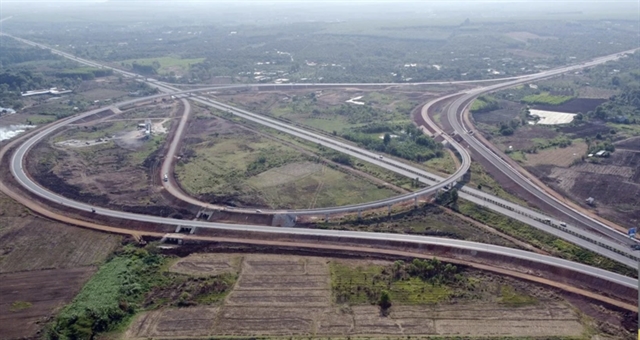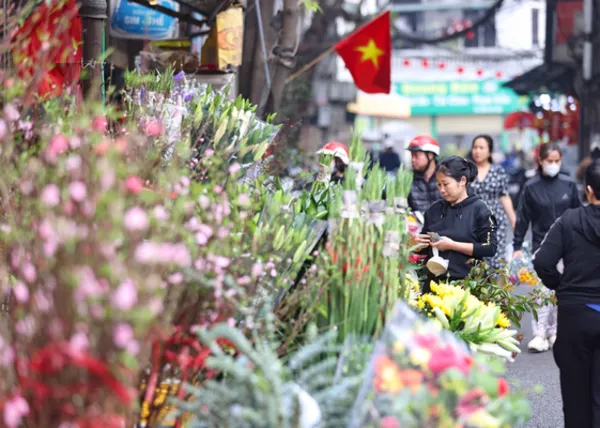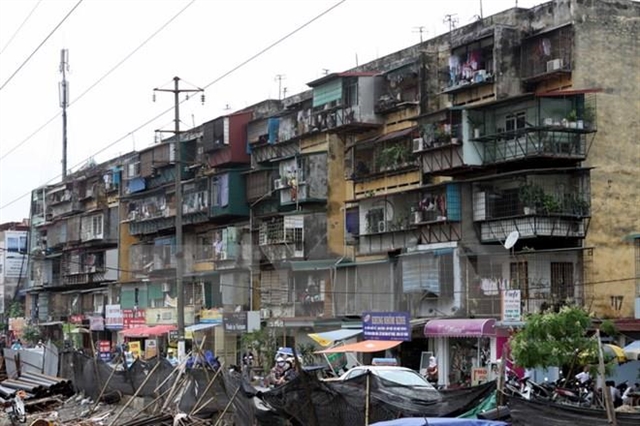 Society
Society

 |
| An old apartment building in Hà Nội. — VNA/VNS Photo |
HÀ NỘI — Hà Nội’s push to redevelop its ageing apartment blocks is mired in challenges, with restrictive planning rules, limited financial incentives and logistical complexities discouraging investors despite the pressing need for modernisation.
At the heart of the issue are rules limiting building height and population density, which make it difficult to achieve profitability.
The city has 1,579 old apartment buildings, most constructed between 1960 and 1990, with many surpassing fifty years of age. Concentrated in four central districts, these buildings include 200 Grade C blocks, 137 Grade B, and seven Grade D, the latter categorised as dangerous and unfit for habitation.
Three years after Hà Nội introduced a redevelopment proposal to address this ageing infrastructure, progress remains frustratingly slow.
Authorities have carried out key steps - such as relocating residents from Grade D buildings, conducting structural evaluations, and gathering public input - but results have fallen short, with projects failing to meet their timelines.
A significant obstacle lies in the misalignment between existing apartment buildings and Hà Nội’s master plan.
According to Mạc Đình Minh, Deputy Director of the Department of Construction, many of these buildings are located on plots now designated for parks or green spaces, while others face strict zoning limits on building height, ranging from just one to five floors. This is at odds with the high population densities already present in these areas.
These constraints make redevelopment projects financially unappealing to investors, who struggle to balance costs with potential returns.
Years of makeshift modifications and expansions by residents have blurred property boundaries, creating a tangle of legal and logistical issues for developers.
These changes also make it challenging to evaluate the structural integrity of buildings.
On top of that, essential infrastructure assessments - such as fire safety, water supply, wastewater treatment, and internal traffic systems - are incomplete. Compounding these issues is a regulatory maze.
Changes introduced in the Housing Law 2023 and Decree 98/2024/NĐ-CP have created a disconnect between existing conditions and current legal frameworks. The result is a lack of clarity on how redevelopment should proceed.
Investors are further deterred by unresolved compensation disputes with residents. Demands for excessively high compensation packages, coupled with inadequate resettlement proposals, have made it financially infeasible for developers to move forward.
Meanwhile, ambiguities surrounding State-owned land within apartment block sites create additional delays, leaving many projects stuck in limbo.
In an effort to accelerate redevelopment, Hà Nội’s Department of Construction has outlined a series of measures designed to address these challenges.
District authorities were urged to finalise detailed redevelopment plans in line with city regulations. These plans must outline project boundaries and prioritise phased investments to ensure compliance with the Housing Law 2023 and Decree 98/2024/NĐ-CP.
Focus is initially be directed towards critical zones such as Giảng Võ, Khương Thượng, and Trung Tự. Tasks include preparing compensation schemes, relocating residents, clearing land, and allocating space for new developments.
Although earlier planning studies have become outdated due to regulatory changes, they will be reviewed and adapted to streamline the creation of new detailed plans. This approach could save significant time and resources.
Districts were asked to prioritise building inspections and infrastructure assessments, including fire safety and wastewater systems. These evaluations will serve as the foundation for redevelopment decisions.
Hà Nội’s Vice Chairman, Dương Đức Tuấn, has emphasised the city’s commitment to urban renewal, describing the redevelopment of old apartments as a cornerstone of its transformation into a modern, civilised metropolis. Immediate actions include reviewing district-level challenges, reporting specific bottlenecks and proposing clear, actionable solutions.
The city sees redevelopment not just as an infrastructure project but as a social mission to improve living conditions and provide secure housing for its residents.
However, achieving these goals will require overcoming significant hurdles, from regulatory bottlenecks to financial disputes.
While the path to redeveloping Hà Nội’s old apartment buildings is fraught with challenges, the city remains committed to its vision.
By addressing investor concerns, aligning outdated plans with modern regulations, and fostering better collaboration among stakeholders, Hà Nội hopes to turn its ageing infrastructure into an opportunity for growth and modernisation.
The success of this initiative will serve as a litmus test for its ability to balance heritage preservation with the demands of a rapidly modernising urban landscape. — VNS




